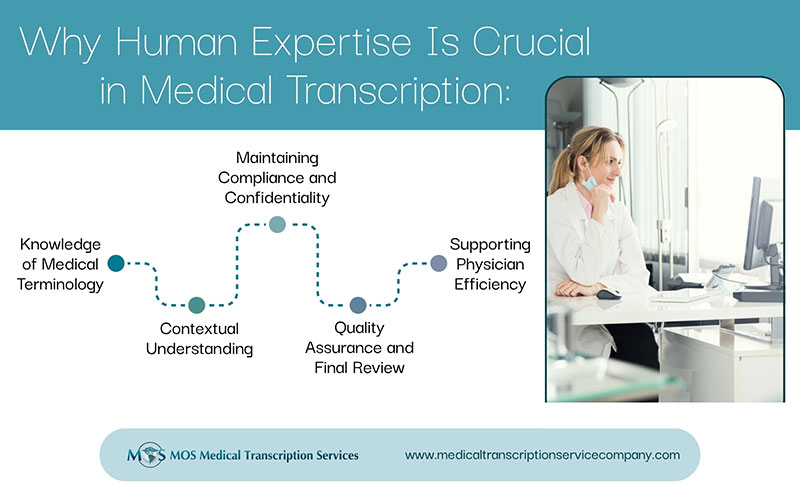
Table of Contents
Ignorance may be bliss sometimes, but not when it comes to patients. Patients should be educated to be proactive about managing their health. Patient education empowers patients to participate in their own health care and make lifestyle changes to prevent or manage illnesses. Physicians can leverage electronic health records (EHRs) and medical transcription services to provide patients with detailed and accurate information about their health and health care. Other methods physicians can use to reach out to patients include websites, text messaging, and email.
The American Academy of Family Physicians (AAFP defines patient education as “the process of influencing patient behavior and producing the changes in knowledge, attitudes and skills necessary to maintain or improve health”. When patients don’t have proper health literacy-the ability to understand, engage, and act upon health information-it can negatively impact health. In today’s world, with so much of medical misinformation doing the rounds on social media, educating patients and promoting trustworthy health information is paramount.
Reasons why Patient Education is Important
To provide patient education, healthcare providers need to understand the reasons why it is so crucial:
- Supports engagement in pre- and post-care management: Providers can educate patients on preparing for a particular procedure, ensuring they have completed any necessary tasks. This includes getting the necessary lab work, quitting smoking, adjusting their medications, and dietary advice. Post-care management strategies help patients take care of themselves after a procedure and includes advice on recovery in terms of treatment, follow-up, medication, diet, and home care. When patients are scheduled for surgery, they also need to be educated about treatment options and the risks and benefits of the procedure and its possible side effects. Studies have found that when people are well-informed about their treatment options, they enjoy a better outcome and are more satisfied with their results.
- Promotes prevention or management of chronic diseases: Chronic conditions such as heart disease, cancer, stroke, lung disease and injuries are the leading cause of death in the United States. It is important to educate patients on importance of leading a healthy lifestyle to prevent chronic disease. Patient education also helps patients self-manage chronic disease. Such education is vital as the management of chronic diseases usually happens at home. When patients are knowledgeable about their condition, it will help them take the recommended steps to stay well and experience better outcomes. For instance, teaching patients with diabetes about how to measure their blood sugars, what to do if they feel a blood sugar drop, how to use continuous glucose monitors, and diet or exercise plans, can help them better manage their condition.
- Provides information about preventive care: Providers should educate patients about the importance of timely screening and other preventive measures like getting the annual flu shot. Patient adherence to preventive care services is critical to prevent a chronic or acute illness. It can also help detect such illness early, which is important for better success with treatment.
- Addresses patient-held medical misinformation: Educating patients is important to combat medical misinformation Even while patients trust their providers, they often turn to other sources to get medical information. For instance, people usually turn to Google to find information about medical conditions and their signs and symptoms and more. A new WHO review found that incorrect interpretations of health information, which increase during outbreaks and disasters, often negatively impact people’s mental health and increase vaccine hesitancy, and can delay the provision of health care (www.who.int)
While government health agencies, professional organizations, and patient advocacy groups may provide accurate information, there are many sources, including social media, that do not. Patient-held medical misinformation can have serious health consequences. Health care professionals need to invest time to hear out medical misinformation that patients describe, explain the facts, and work with them to ensure that they seek information only from credible sources.
Key Patient Education Strategies
Good patient education depends on using the strategies that are right for each patient. Here are various tools that healthcare providers can use to educate patients:
- Brochures and printed booklets in relevant languages
- Posters and charts
- PowerPoint presentations
- Podcasts
- YouTube videos
- Models or props
- Group classes
- Peer educators
As response to these measures may vary from person to person, providers can consider using a mixed approach that takes account of patient literacy levels and other individual factors. Moreover, these strategies will work best when combined with patient teach-back – checking patients’ understanding by asking them to describe in their own words what they need to know or do about their health.
Best Practices for Patient Education
Healthcare organizations should develop a robust patient education program and do the following:
- Educate patients at every encounter from admission to discharge.
- Involve family
- Consider patients’ strengths and weaknesses
- Listen to the patient and correct any misinformation.
- Use simple strategies and visual aids that patients can understand.
- Ask patients to repeat their self-care instructions and how they will explain their disease or treatment to their loved one.
- Provide clear instructions on medications, including administration, and make sure patients understand when to refill medications.
- Tell patients about signs and symptoms of their condition that will require immediate attention.
Family physicians or primary care physicians are specially qualified to provide comprehensive care for people of all ages. They treat most ailments and provide routine health screenings and counseling to encourage and support changes in lifestyle with the aim to prevent illnesses. The basis of family medicine is an ongoing, personal patient-physician relationship, which makes them ideally positioned to provide patient education. Educating patients is an ongoing process and you need to delegate more responsibilities to support staff focused on patient education. A family medical transcription company can help provider manage medical documentation and ensure that all interactions with patients are properly documented.


